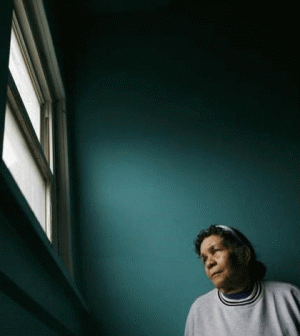- Finding Unshakable Power in a World That Wants to Pull Us ApartPosted 5 months ago
- What could a Donald Trump presidency mean for abortion rights?Posted 5 months ago
- Financial Empowerment: The Game-Changer for Women in Relationships and BeyondPosted 6 months ago
- Mental Health and Wellbeing Tips During and After PregnancyPosted 6 months ago
- Fall Renewal: Step outside your Comfort Zone & Experience Vibrant ChangePosted 6 months ago
- Women Entrepreneurs Need Support SystemsPosted 6 months ago
US women far more likely than men to be poor in retirement, research shows

Source: Thomson Reuters Foundation – trust.org
Author: Ellen Wulfhorst
In a 2009 file photo, Myrna Millington, 73, stands inside her home which is under foreclosure in New York. REUTERS/Shannon Stapleton
Women in the United States are 80 percent more likely than men to fall into poverty once they retire because they earned less than men on the job, took time off for their families and tend to live longer, researchers have found.
Income for women age 65 and older is typically 25 percent lower than income for men of the same age, the Washington, D.C.-based National Institute on Retirement Security (NIRS) said in a report released on Tuesday.
Men’s income is 44 percent more than women’s income by age 80 or older, it said.
“The fact that women over 65 are 80 percent more likely than men to fall into poverty in their retirement years is tragic and should be a call to action for policymakers,” Diane Oakley, executive director of the NIRS non-profit research center and co-author of the report, said in a statement.
Analyzing U.S. Census Bureau data, the researchers found women ages 75 to 79 are three times more likely than men to live in poverty, and widowed women are twice as likely to live in poverty than widowed men.
“Women are financially disadvantaged because we still earn less than men and we typically take time out of our careers for care giving – both of which reduce our ability to prepare for retirement,” Oakley said.
Women also need a bigger nest egg for retirement because they tend to live longer than men, she said.
Lifetime earnings affect the amounts of U.S. government Social Security benefits, pension income and retirement savings, and in the United States, women earn 79 percent of what men earn doing the same work, the report noted.
The NIRS called for increases in Social Security benefits and cost-of-living adjustments, and in eligibility for part-time workers in employer-sponsored retirement plans. It also called for the development of retirement savings plans by U.S. states.
(Reporting by Ellen Wulfhorst, editing by Alisa Tang. Please credit the Thomson Reuters Foundation, the charitable arm of Thomson Reuters, that covers humanitarian news, women’s rights, trafficking, corruption and climate change. Visit http://news.trust.org)






